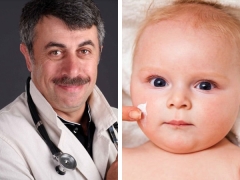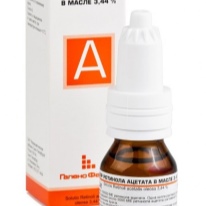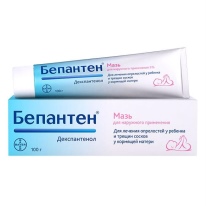Dr. Komarovsky on the causes of dry skin in a child
Every mother really wants her baby to look like in a commercial - puffy, smiling, with delicate velvety skin, about which one just wants to rub his cheek. However, in practice, babies do not always look so appetizing, and such a problem, like dry skin in a child, gives his parents a lot of reasons for anxiety. Authoritative pediatrician Yevgeny Komarovsky tells us what causes dryness of the skin in an infant can cause, and what parents can do.
Features of children's skin
The skin of an infant is significantly different from the skin of its parents. She is more vulnerable, tender. In the first year of life, the sweat glands are not sufficiently developed, and therefore the child has to give off extra heat through pulmonary respiration. If at the same time the baby has to breathe too dry air, or he lives in a room where all the time, by the efforts of mother and grandmother, it is hot, then the load on the immature sweat glands grows and the skin deteriorates.
The stratum corneum (uppermost) in children's skin is well supplied with blood, therefore, any scratches on the baby heal faster than on adult skin. However, the stratum corneum, thin and loosely connected to other skin layers, creates favorable conditions for irritation and injury.
Initially, dry skin in infants is almost never due to lipid saturation - a congenital feature of all toxins. But these fats perfectly dissolve most of the chemicals that are contained in laundry detergent, soap, urine, and therefore inflammation of the skin in babies is common. Dry skin can also result from health problems.
Causes of Dryness
The most common cause of dryness in which the skin feels somewhat rough is contact dermatitis, says Yevgeny Komarovsky. When it is, the skin is damaged due to contact with chemicals contained in laundry detergent or household chemicals used by the mother for cleaning. Contact dermatitis often occurs in response to chlorinated tap water, with which the baby is bathed and washed away.
If a child has dry skin on lips, as a result of which lips crack, there can be several reasons:
- dry air in the room;
- vitamin A deficiency;
- side effects of some drugs;
- allergic reaction;
- herpes virus.
If a child has dry skin on the cheeks or nose, as a result of which it often flakes, you can talk about a lack of vitamins E, A, as well as allergies.
In 90% of cases, dry skin of the toddler is caused by parents breaking the rules of a favorable microclimate - it is hot and dry in the house.
Treatment
Contact dermatitis, in which the lesion is insignificant and looks like small dry spots, eliminates local use of moisturizers, such as children's creams with the addition of aloe. The most effective local medicine, according to Yevgeny Komarovsky, is an ointment or cream.Bepanten». With more extensive lesions, the microclimate should be changed in the room where the child is.
Water for bathing you need to boil or filter, wash the bedding and clothes of your baby only with special children's powder, which has “Hypoallergenic” mark on the packaging. After washing, things need to be additionally rinsed not with ordinary tap water, but with pre-boiled water, since during the process of boiling the liquid gets rid of chlorine.
In the next video, Dr. Komarovsky talks about skin problems with allergic dermatitis.
If the skin dries due to an allergic reaction, the doctor may prescribe antihistamines, you will need to find the true cause of the inadequate response of the body. This is the task of the allergist doctor, and parents need to take care that the child does not have contact with the most common allergens - animal hair, dust, plant pollen, chemicals and chlorine. It is important to ensure that the baby does not sweat, so do not re-entangle him, and the room - peretaplivat.
Cracked lips and rough skin on the cheeks and nose are treated according to the reason why they are cracked or dried. Oil solutions of vitamins A and E are almost always prescribed. For topical use, sea buckthorn oil is recommended. For lips, you can use hygienic moisturizing lipstick with aloe. The baby should drink more fluids. When cracking the skin of the feet - heels and fingers, antifungal local therapy and all the same sea buckthorn oil can be prescribed.
Tips of Dr. Komarovsky
Many problems with dry skin can be solved simply by creating normal conditions for the child. It does not matter how much a child is 1 year old or 15 years old; it must breathe in cool and sufficiently moist air. If the temperature in the apartment is maintained at 18–20 degrees, and the relative humidity of the air is at 50–70%, then ointments and creams may not be needed at all, because under such environmental conditions the skin dries out rarely.
Dermatologists advise children (for whom this has already happened) (and Komarovsky completely agree with them!) Not to use hot baths for bathing, it is better to limit yourself to warm water, less often to use detergents - gels, foams and shampoos. It is enough to use baby soap once a week. Bathing time for such babies should not exceed 10-15 minutes, while the door to the bath should be tightly closed so as not to reduce the humidity. After bathing a child with dry skin, do not wipe with a towel, but gently wipe them with care.
When choosing a moisturizer, parents should prefer the options with the addition of oils. Do not use gels and shampoos with a pronounced odor, saturated perfume additives and dyes. From the huge assortment of soap is better to choose liquid baby.
Parents of a child with dry skin should make sure that the carypus, crawling or playing, does not rub against carpets, so that the clothes do not rub him into “problem” places. Particular attention should be paid to the choice of disposable the diaper, it is best to give preference to manufacturers who add a layer of aloe balm to the pampers.
A child with a tendency to dry skin should not stay long in the open sun. If you are going to have a vacation by the sea, mom must take care that the child is smeared with moisturizing agents with UV protection, and in the evening, after a shower, with a baby cream.

















